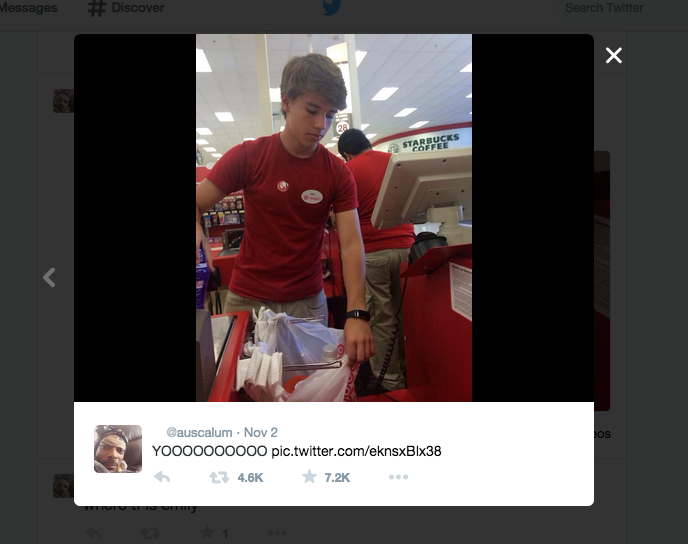“Alex from Target” shows fandoms have power
Photo courtesy of www.twitter.com. “Alex from Target” represent the power of fandoms and social media.
November 30, 2014
On Nov. 2, Twitter user @auscalum took a picture of Alex, an attractive teenage boy who works at a Target in Texas, and uploaded it to the Internet with “YOOOOOOOOOO” as the caption. Since then, the trend “Alex from Target” became a huge hit, with thousands of memes and fanfictions created about him. In fact, another Twitter user Dream Closet (@TheDreamCloset) even created an “Alex from Target” outfit, equipped with the iconic red shirt and khaki pants that Target employees must wear.
Alex became famous overnight through social media and fandoms. He now has over 753,000 followers on Twitter, and even had to change his phone number. His fame also began to influence a trend of people taking pictures of who they considered to be cute workers at stores, such as “Kieran from T-Mobile” and “Steve from Starbucks.”
One key reason why Alex became so popular was due to his fandom, which, according to the Oxford English Dictionary, includes “enthusiasts for some amusement or some artist.”
Fandoms play a big role in today’s pop culture, especially for television shows. According to Public Broadcasting Service (PBS), the famous British Broadcasting Corporation (BBC) television show “Sherlock” had nearly 11 million views when the second season came out, not to mention that Benedict Cumberbatch, the main actor for “Sherlock,” has more than 312,000 likes on his Facebook page. On fanfiction.net, a site in which users can create their own fanfiction about existing characters on television shows and movies, “Sherlock” has at least 4,000 fanfiction stories written about it.
However, are fandoms taking their enthusiasm too far to what might be considered extreme?
As a result from gaining fame almost overnight, Alex from Target had to change his phone number within five days of the creation of this fandom. Alex isn’t even an actor or famous public figure. He’s a normal teenage teenage boy who works at Target. He took no part in becoming famous on the internet; social media and teenage girls who are part of the fandom did it for him.
However, this does not mean fandoms aren’t a bad influence. Fandoms are a way for people to talk about a common interest and spread their ideas and creativity. However, those who participate in big fandoms should be made aware of the times when they may be taking their passions to extremes and could greatly impact the lives of ordinary people, such as Alex from Target.






